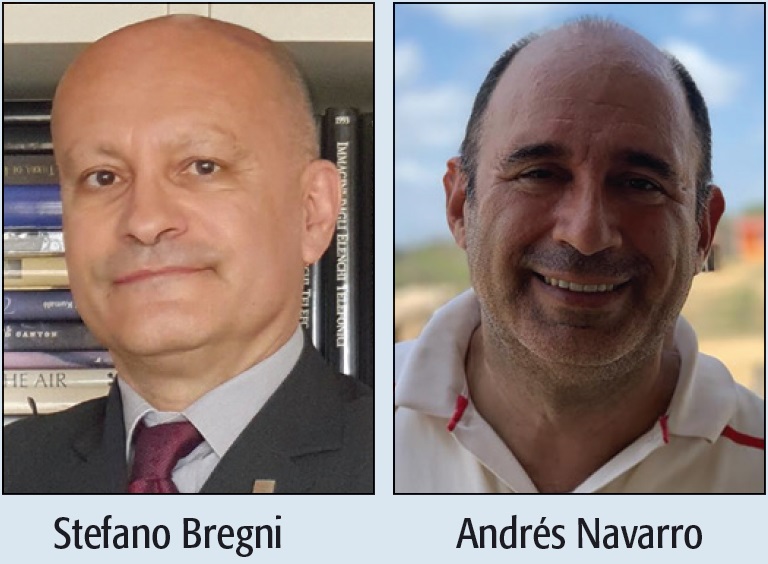
This article continues the series of nine interviews to the Officers of the IEEE ComSoc Member and Global Activities (MGA) Council, which is published every month on the Global Communications Newsletter.
In this series of articles, I introduce the Vice-President and the six Directors on the MGA Council (namely: Member Services, Industry Outreach, and AP, NA, LA, EMEA Regions), as well as the two Chairs of the Women in Communications Engineering (WICE) and Young Professionals (YP) Standing Committees. In each interview, one by one they present their sector activities and plans.
In this issue, I interview Andrés Navarro, IEEE ComSoc LA Region Director.
Andrés is Electronic Engineer (1993), with a Master on Technology Management (1999), both from Universidad Pontificia Bolivariana in Medellín. Obtained his PhD in Telecommunications from Universitat Politécnica de Valencia in 2003. He is IEEE member since 1995 and Senior Member since 2014. Currently is the IEEE Comsoc LATAM Regional Director. As ITU expert, advised different governments in Digital TV and Spectrum Management. Is a participant on COST CA 20120 INTERACT and former actions COST CA15104 IRACON, COST IC1004 and COST 2100. He is coordinator of the CENIT research center for technology in Health, a joint center involving Fundacion Valle del Lili. Director of the i2t research group at Universidad Icesi since 1999. His research interests are Spectrum Management, mobile radio planning, radio propagation and m-health.
Stefano: Hello Andrés! Would you like to begin by introducing the Latin America Region to our readers? What are main challenges?
Andrés: Latin America is a highly populated region with more than 600 million people. Region includes big countries like Mexico and Brazil with a well developed telecommunications market, but also with important deficiencies in telecommunications coverage.
Perhaps one of the main challenges for Comsoc LATAM is to increase the membership and improve relation with industry. We are near 4% of the Comsoc membership but according to our population, we can grow until 10%. The main challenge is Brazil, where membership have an important potential to grow and there are a strong telecommunications industry.
Stefano: You mentioned relations with industry as one of main challenges. Would you tell us more?
Andrés: About relations with industry, we have important challenges because Latin America does not have Telecommunications manufacturers or big companies. Most Operators and manufacturers with presence in the region have their headquarters outside LATAM, which in some way complicates our approaches to industry. We are looking for different approaches to increase our relations with industry, by means of the technical committees in some strategic areas that we are defining and will have some meetings during the second semester. Additionally, we plan to increase the relations with regional WISP (Wireless Internet Service Providers) in order to cooperate and develop connectivity initiatives.
Stefano: The ComSoc Latin America Board has been always very attentive to students. Please tell us something about the many activities that your Board and the LA Chapters are organizing.
Andrés: One of our most dynamic area of growing are the students chapters and activities like Communications day are important to disseminate Comsoc message and relevance to students.
Some chapters like Peru, Ecuador and Panama are quite active with students’ activities and membership numbers shows its success. That’s why Peru won the chapter of the year achievement in 2021
In order to encourage student membership, we have the Young Professional Award, and the student’s contest, which looks to encourage innovative projects between our members. Additionally, we have the Distinguished service award, to ComSoc Members evidencing significant contribution to the development of IEEE Communications Society activities in the Latin America Region.
Stefano: The Virtual Distinguished Lecturer talks were born in LA, before the pandemic. Now, would you like to tell us what is the current status and what you plan to do in the near term?
Currently, as we are returning to in-person activities, we are receiving requests for DLT in-presence and few interest for the VDL format. However, we want to encourage the Virtual Distinguished Lecturer Format because it demonstrated to be a very good option for chapters with limited budget or just when the Budget for DL travel is exhausted. The pandemics show us that we can search for blended strategies, and this is a good option for DL and to increase technical activities in the LA Region. We are planning to organize some seminars with industry partners and Virtual speakers, in order to encourage people from industry to participate in Comsoc technical activities.